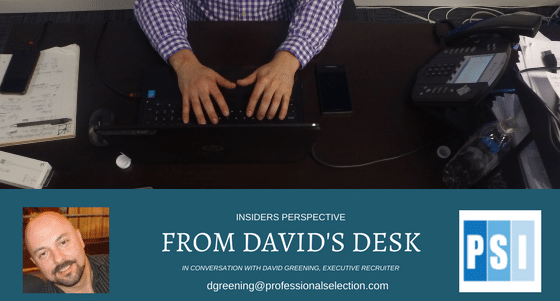I’ve had some great feedback on my last post, where my colleague Dave Greening answered some common questions facing recruiters today. Last time, Dave talked about the role that recruiters play in the job search. Today, he’s agreed to follow up on some of the common questions we got from other staffing professionals. You can find part one here.
So here it is, Dave Greening: Part Two.
Suky: David, how do you deal with the desired base salary question?
David: I realize it’s used to weed out unrealistic expectations with a candidate, and so is there ever a perfect time in your conversation with candidates to bring this up?
My personality is very much a “take the bull by the horns” type, so I will always get it out of the way right from the get-go. I have experienced the consequences of not doing this, and will therefore do everything in my power to avoid it happening again. I feel like I could be recruiting for the next 20 years and I would never get it right 100% of the time. You always run the risk of scaring someone off by bringing it up right away, or by saying that the salary offered for the position you are considering them for is different. But hey, if they get scared off at this point, your chances of closing the deal were not all that high to begin with.
In the niche type of recruitment that we do, it seems the compensation part of the discussion is more important to our candidate pool than any other. The majority of people I speak with on a daily basis would rank financial reward as their number one motivator. When the compensation discussion isn’t going as well as you would like, you really have to know how to talk about all of the other reasons why the role is a good career move for them. You need to talk about culture fit, career advancement, mentorship, job satisfaction, etc. All of the things you cannot put a dollar value on.
Suky: There’s a wide range of opinion on people looking for new roles while they are in transition. What kinds of things are you looking to hear when a person explains why he or she is in transition, and why is it important?
David: I have helped a number of people into new roles who, for whatever reason, have taken some time away from the recruitment industry. This ranges from taking a role in another industry, or even being out of the workforce altogether. For instance, I am representing a candidate right now who took a year off to help his wife set up a small business, and is now looking to get another role in staffing. It has proven to be a bit of a challenge but I am determined to set him up with a great opportunity because I know how talented he is at the job.
I find the recruitment industry, even in a large city like Toronto, or even throughout all Canada for that matter, is fairly connected. Honesty is the best policy when talking about these things, because the truth always finds its way to the surface one way or another. Our clients are pretty reasonable people with families, lives, and situations of their own. As long as they feel they are being told the sincere truth about things, they will most often not prejudge a person for those reasons. The most important thing is that the candidate and I are able to convince the client that the candidate is capable of doing the job at hand.
This is where the power of relationships comes in. I would not stick my neck out and say “trust me” with a client if I was not confident in doing so. I hope that doing a good job for my client overall will allow me the benefit of the doubt in situations like this. Getting it right more times than you get it wrong, that’s the key.



